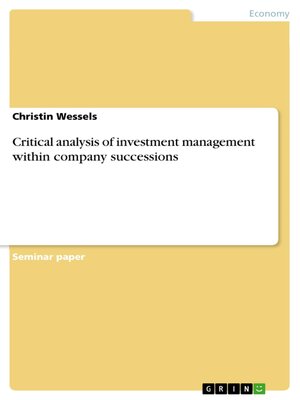
Sign up to save your library
With an OverDrive account, you can save your favorite libraries for at-a-glance information about availability. Find out more about OverDrive accounts.
Find this title in Libby, the library reading app by OverDrive.



Search for a digital library with this title
Title found at these libraries:
| Library Name | Distance |
|---|---|
| Loading... |
Seminar paper from the year 2017 in the subject Business economics - Investment and Finance, grade: 1,7, University of applied sciences Dortmund, course: Investment, language: English, abstract: Company successions are an important theme for the economy. The amount of enterprises, which search for a successor, increased in the last years. Especially small and medium-sized enterprises are affected by this issue. In this case the issue arises, that no internal successor is available. That's why external opportunities have to be considered. Among options like foundations or management buy-outs, private equity investors are one possibility of a successor. These investors bring new equity and know how into the enterprise. On the other side, private equity firms often invest only for a defined period and focus on the return on investments. That's why private equity firms mention in the sales contract specific rights and agreements. These rights include e.g., that other shareholder have to sell their shares, if the private equity firm wants to sell its shares. Furthermore, if the private equity firm wants to go public, the other shareholders must agree. If these rights are reflected in the sales contract, the private equity firm has the total power over the enterprise. That's why especially in the contract phase the current entrepreneur should be alerted, what agreements are reflected in the contract. Otherwise the PE firm holds sway over the whole company. After the defined time horizon, the private equity firm leaves the enterprise. For this different exit strategies exist: An Initial public offering, a trade sale, a secondary sale or a buy back. The most interesting one for the investor is to go public, followed by a trade sale. Going public means a high return on investments for the investor. All in all, the entrepreneur holds the strings: He can influence the future of the company, because he chooses the successor for the enterprise. If he reflects, what the enterprise needs and gets the motivation of the investor, why he wants to buy the enterprise, he can choose the right successor for his company.







